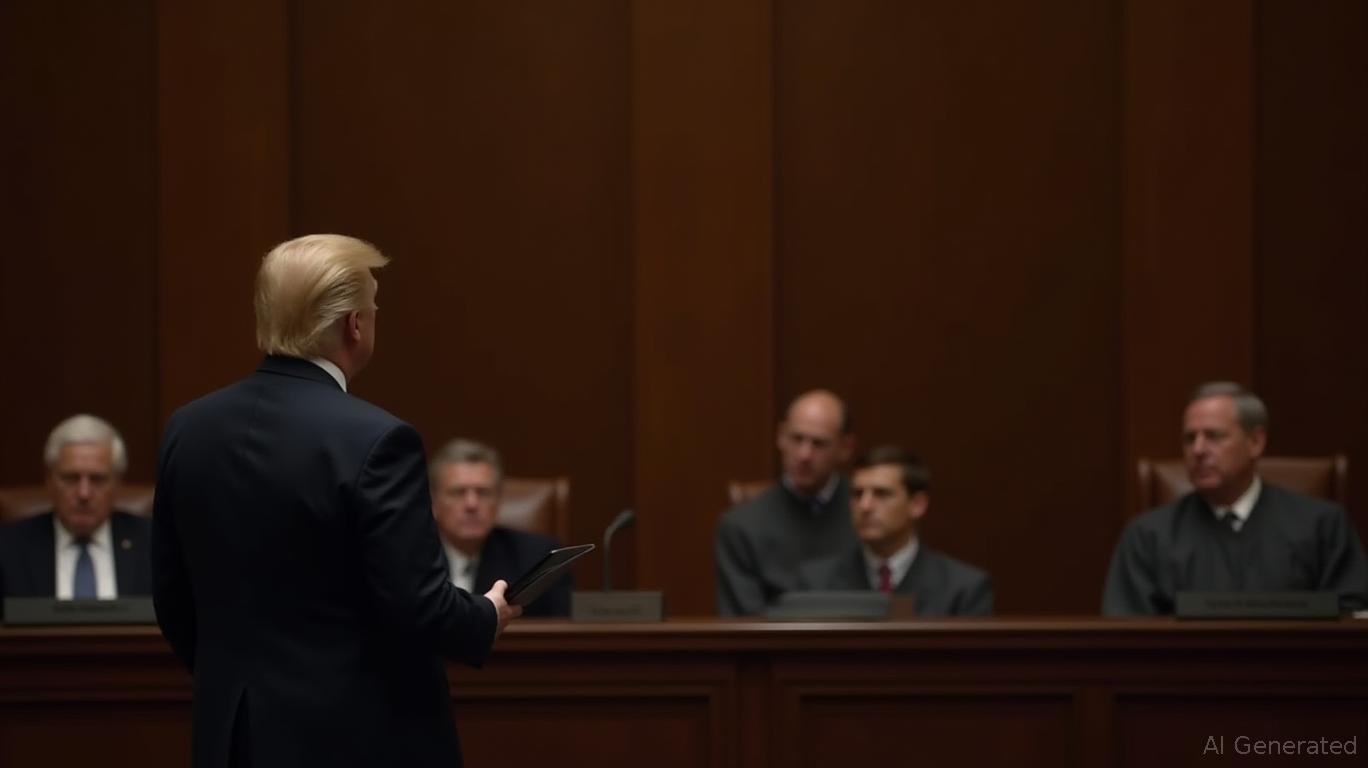As Canadian Tariffs Increase, Supreme Court Scrutinizes Trump’s Authority on Emergency Trade Measures
- U.S. President Trump imposed 10% tariffs on Canadian imports after Ontario aired a $75M anti-tariff ad featuring Reagan, escalating bilateral tensions. - Canada announced targeted steel/aluminum tariff exemptions and shifted trade focus to Southeast Asia, as Trump froze negotiations and imposed 50% tariffs on Canadian steel/aluminum. - Alcoa Corp. reported $69M in costs from Canadian tariffs, while U.S. aluminum premiums surged 113%, highlighting economic impacts. - Legal challenges loom as the U.S. Supr
On October 24, 2025, President Donald Trump announced a new 10% tariff on goods imported from Canada, further straining relations after Ontario aired a $75 million anti-tariff commercial during the World Series, featuring the voice of former U.S. President Ronald Reagan. The advertisement, which openly criticized Trump's trade approach and was not immediately pulled, led Trump to accuse Canada of "fraud" and "cheating," resulting in the sudden halt of trade talks, as reported by
Ontario Premier Doug Ford was behind the ad, which referenced Reagan's 1987 comments on tariffs, arguing that such measures are damaging to both consumers and businesses. Since his re-election, Trump has made tariffs a key part of his economic agenda. In response to the ad, he suspended negotiations with Canadian Prime Minister Mark Carney, who has described the discussions as "constructive" but stressed that Canada cannot dictate U.S. trade policy, according to Cryptopolitan. This development is the latest in a series of disputes, including Trump's previous 50% tariffs on Canadian steel and aluminum, which have negatively affected industries in both countries, as outlined in

Canadian authorities have tried to soften the blow by introducing targeted tariff exemptions. Finance Minister François-Philippe Champagne announced relief measures for certain U.S. and Chinese steel and aluminum imports to help key domestic sectors such as public health, national security, and agriculture, according to
The U.S. aluminum sector remains at the center of the trade dispute.
Canadian labor unions have stepped up their demands for government intervention as layoffs tied to tariffs increase. Unifor, the largest private-sector union in Canada, called for urgent government procurement measures to save the PACCAR truck factory in Quebec, which recently announced 300 more layoffs due to U.S. tariffs. Union representatives argued that local governments should prioritize domestic purchasing to safeguard jobs and industrial skills, according to
On the legal front, Trump’s authority to impose tariffs is being challenged in the U.S. Supreme Court, which will hear arguments on November 5 regarding the president’s power to enact tariffs under emergency provisions. Trump has defended the tariffs as essential for national security and economic stability, even as courts have found parts of his policy unconstitutional, as reported by Global News. The Justice Department has cautioned that lifting the tariffs could bring “financial ruin” to the U.S., while opponents claim the measures infringe on Congress’s trade authority.
As the dispute continues, Carney’s administration is navigating a complicated environment. While Trump has accused Canada of trying to sway the Supreme Court case with its ad, Ottawa insists its actions are lawful. Carney’s emphasis on ASEAN and other trade partners signals a broader effort to lessen reliance on the U.S. market, even as talks over steel, aluminum, and energy remain at a standstill, according to Cryptopolitan.
Disclaimer: The content of this article solely reflects the author's opinion and does not represent the platform in any capacity. This article is not intended to serve as a reference for making investment decisions.
You may also like
Zcash (ZEC) Experiences Sharp Price Increase in November 2025: Evaluating Drivers and Long-Term Viability for Cryptocurrency Investors
- Zcash (ZEC) surged 1,500% in November 2025, peaking at $750 amid broader market declines, driven by institutional investments and privacy-focused demand. - Key catalysts include Cypherpunk Technologies' $18M ZEC purchase and Winklevoss Capital's $58.88M investment, boosting institutional adoption and market cap. - Product innovations like Zashi Wallet and on-chain activity spikes (73,862 daily transactions) highlight ZEC's privacy utility, though regulatory risks and ecosystem gaps remain challenges.
ICP Value Jumps 30% Over the Past Week as Ecosystem Broadens Strategically
- ICP's 30% price surge stems from strategic expansions, institutional partnerships, and decentralized AI advancements. - AIO-2030's launch positions ICP as a core infrastructure layer for privacy-preserving, cross-chain AI collaboration. - Inovia Capital's Abu Dhabi expansion signals institutional interest in ICP's blockchain-driven AI solutions in the Middle East. - Technical indicators show bullish momentum, with $6.00 as a key target and $8.25 as potential long-term resistance. - ICP's unique decentral
Internet Computer's Latest Rally: Will the Momentum Last or Is It Just a Temporary Spike?
- Internet Computer (ICP) surged in late 2025 due to institutional partnerships, technical upgrades, and speculative trading, but faces data credibility concerns. - Discrepancies in TVL figures (e.g., $237B vs. $1.14B) and unverified active wallet claims raise doubts about reported metrics and market fundamentals. - DApp usage dropped 22.4% in Q3 2025, highlighting a gap between infrastructure growth and user adoption, despite 50% compute capacity improvements. - Speculative trading volumes rose 261%, alig
Solana's Latest Price Fluctuations and Network Efficiency: Evaluating the Long-Term Investment Potential of High-Performance Smart Contract Platforms
- Solana maintains high-performance blockchain status with sub-2-second finality and low fees, attracting institutional adoption via Coinbase and PrimeXBT integrations. - Network faces declining user activity (3. 3M active addresses) and overreliance on speculative trading/meme coins, creating volatility risks for long-term viability. - Emerging competitors like Mutuum Finance challenge Solana by offering real-world asset tokenization models, highlighting need for non-speculative use cases. - Investors mus